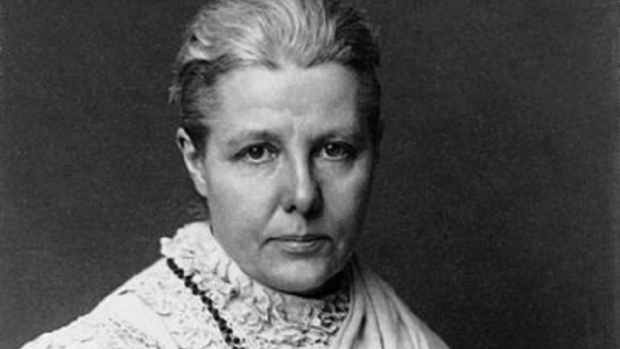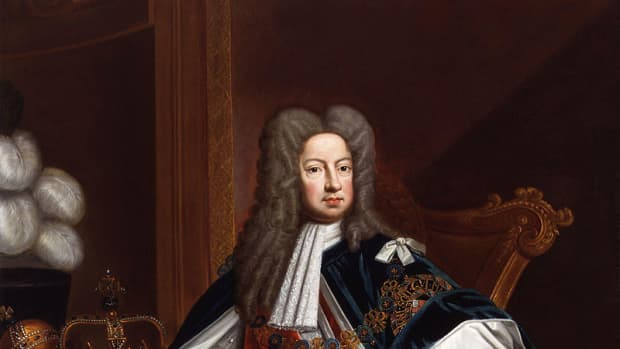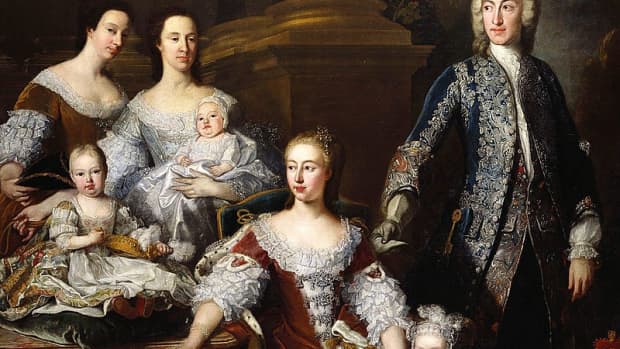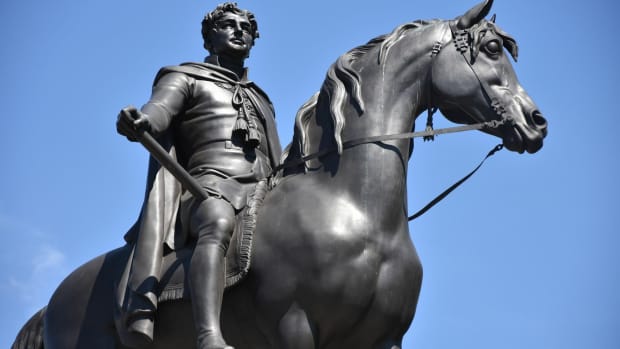King George I's Mother, Sophia Dorothea: Britain's Queen in Waiting
Sophia Dorothea, Electress of Hanover but Not Queen of Britain
The matriarch of the Hanoverian dynasty during the late 17th and early 18th centuries was Sophia Dorothea, Electress of Hanover. She was destined to be remembered, or overlooked, as the queen that Britain never had.
The 1701 Act of Settlement was drawn up by Queen Anne from the House of Stuart and the British government when Anne and her husband George of Denmark's last surviving and sickly child, Prince William, Duke of Gloucester, died in July 1700, aged eleven.
Poor Anne fell pregnant numerous times, but tragedy after tragedy meant that she would die childless. The act named Sophia Dorothea as the heir presumptive to the frequently ailing queen.
Why Was Sophia Dorothea Queen Anne's Heir?
Between 1701 and 1714, Sophia Dorothea was the first protestant in the line of succession to the British throne. There were over 50 royals in front of her, but they were all Catholics, and so they were barred from the succession.
Sophia Dorothea was the granddaughter of King James I (VI of Scotland) through her mother, Elizabeth. She was a great-granddaughter of Mary, Queen of Scots.
Elizabeth Stuart, known to history as "the Winter Queen", was a much sought-after bride, especially after her brother Henry, Prince of Wales, died in November 1612, and she became the second in line to the British throne after the future Charles I.
She married the 16-year-old devout protestant Friedrich V, Elector of the Palatine, in a lavish wedding on 14th February 1613 at the Chapel Royal in Whitehall Palace. The bride and groom quite liked one another at first, and they had 13 children. Familiarity bred discontent.
Ernst August, Duke of Brunswick-Luneberg
Sophia Dorothea's father died in November 1632 from an infection caught in battle. She was just two years old. Her childhood was spent in exile at The Hague with her mother, siblings and other Stuart descendants, including her cousin King Charles II, who tried to secure her as his bride.
In September 1658, Sophia Dorothea married her third cousin on her mother’s side, Ernst August, the youngest son of Georg, Duke of Brunswick-Lűneburg and his wife, Anne Eleonore of Hesse-Darmstadt.
Sophia Dorothea was previously betrothed to his brother Georg Wilhelm, but he called off the wedding. She was passed to Ernst August, and Georg Wilhelm's Luneberg claims and fortune were transferred to Ernst August.
Sophia Dorothea was Ernst August's consort as he gained the title of Administrator of the Prince-Bishopric of Osnabrűck in 1662, Prince of Calenburg and Duke of Brunswick-Lűneburg in 1679 and the Elector of Hanover in 1692.
Sophia Dorothea as a Chatelaine and Mother
Sophia Dorothea was popular with the Hanoverians. She was considered a great beauty, and she was a renowned patron of the arts and an intellect. She was celebrated around Europe for her enlightened views. She invited philosophers, artists and musicians to her court at Schloss Herrenhausen which she improved. She commissioned new gardens for the castle in 1683.
Ernst August and Sophia Dorothea's marriage brought them six surviving sons and one daughter. The children were petrified of their austere, militaristic father. He was distant and demanded total obedience; they looked to Sophia Dorothea to temper his ferocity, but she didn't always oblige them.
Recommended
Sophia Dorothea's primary reason for not assisting her children more often was that Ernst August's countless affairs hurt her. Over the years, she came to love her husband, quite unusually for an aristocratic union, and to win his good opinion, she shied away from challenging or contradicting him.
She was otherwise a moderately good mother, and she hated to be away from her children.
Regrettably, but not unexpectedly, the future George I was similar to his father in his brusque manner, intolerance and parenting style.
Sophia Dorothea's Younger Sons Were Disinherited
Ernst August disinherited his younger sons in 1683 so that his titles, lands and fortune would pass in their entirety to Georg Ludwig. Ernst August and his brother Georg Wilhelm arranged a marriage between Georg Ludwig and his equally unenthusiastic cousin Sophia (Georg Wilhelm's daughter) to ensure more land and wealth passed to one person.
Sophia Dorothea did very little to help her younger offspring in their moment of distress. Friedrich Augustus, Karl Philipp and Christian Heinrich enlisted in the Imperial Army in protest at their father’s decision. The first two were killed in battle in 1690, and Christian Heinrich drowned while fighting in 1703. They were sincerely mourned by their mother, but presumably, she felt no guilt about her inaction.
Maximilian Wilhelm rose to the rank of Imperial Field Marshal, and he became a catholic. Ernst August was a soldier, the Bishop of Osnabruck, and from autumn 1714, he was the most senior Hanoverian in the electorate. He became the Duke of York and Albany in 1716. Their sister became Queen Sophia Charlotte of Prussia through marriage; she died from pneumonia at age 36.
Sophia Dorothea was widowed in 1698.
George I, Hanoverian King of Britain
After years of robust health and acclaim across mainland Europe, the 83-year-old Sophia Dorothea was caught in a rain shower and she fell ill. She died on 8th June 1714. Forty-nine-year-old Queen Anne survived until 1st August 1714.
That autumn, the British warily accepted Sophia Dorothea's oldest son, Georg Ludwig, as George I, their first House of Hanover monarch.
He arrived in Britain with his mistress, his half-sister (who most onlookers thought was another mistress), his son Georg August, the future George II, his wife Caroline and their daughters.
He'd divorced Sophia Dorothea of Celle in 1694, and the family had agreed to have her incarcerated for the rest of her life at Celle Castle.
News of the lack of a queen and stories about his ex-wife languishing in a remote castle preceded him, and George was quickly branded "the Turnip King" by his British subjects. They believed that Hanover was a sleepy backwater and that barely English-speaking George was unequal to the challenge of ruling over them. (People were arrested outside his coronation for waving turnips in the air).
Would the public have been so discourteous to enlightened Sophia Dorothea? That question will never be answered, but she may have fared better and won their affection as a mother or grandmother of the nation.
Sources
- The Almost Queen: Sophia of the Palatinate – Rebecca Starr Brown
- Sophia, Princess Palatine of the Rhine
Child of Frederick V, Elector Palatine, 'the Winter King of Bohemia' and Elizabeth Stuart, the only surviving daughter of King James VI and I - Sophia of the Palatinate, Electress of Hanover | Unofficial Royalty
This content is accurate and true to the best of the author’s knowledge and is not meant to substitute for formal and individualized advice from a qualified professional.
© 2023 Joanne Hayle












